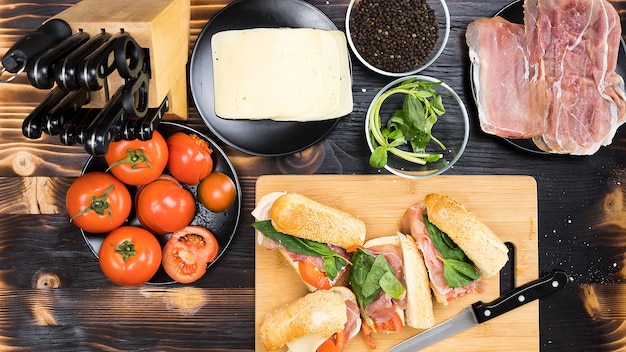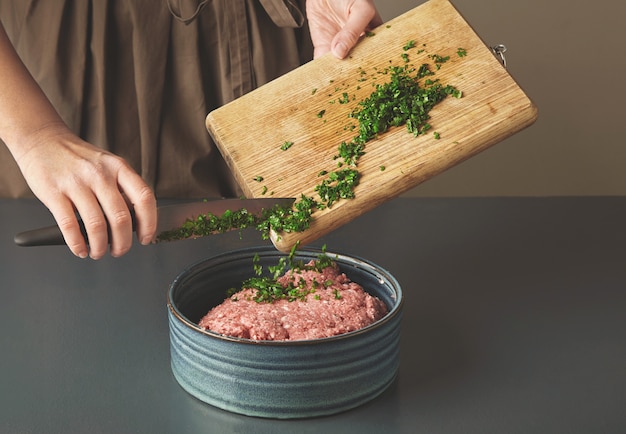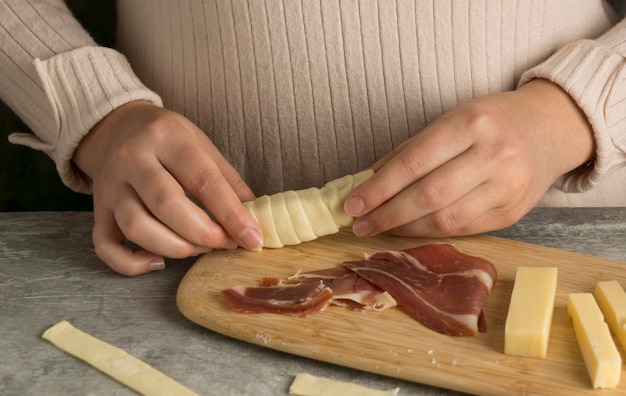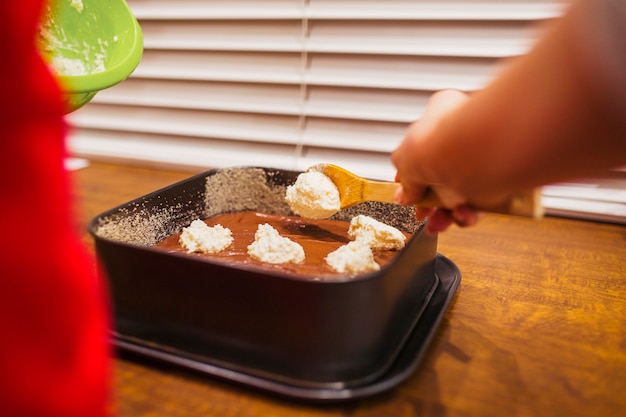Let's face it, tackling a ham can feel a bit daunting, especially when you're unsure about the right cooking time and techniques. But fear not! I've been there, and I'm here to guide you through every step, from picking the perfect ham to creating a mouth-watering glaze. So, grab a comfy seat, pour yourself a cuppa, and let's dive into the delicious world of ham cooking!
(Part 1) The Ham Hunt: Choosing Your Perfect Match

spiral-sliced hams
These are my personal favorites for their convenience. They're pre-cooked, saving you precious oven time, and they're already sliced, making carving a breeze. They're perfect for feeding a crowd or for a quick weeknight dinner.Bone-In Hams
These are usually larger and often boast a more intense flavor. Be prepared to calculate cooking time based on weight, and you'll need to carve the ham yourself, which can be a bit of a workout but a rewarding one.boneless hams
These are a great option if you need a more compact ham for a smaller group. They're often pre-cooked, but some might require a little extra cooking time to achieve that delicious crispy crust.canned hams
These are perfect for a quick and easy meal. They're pre-cooked and require minimal effort. Simply open the can, pop it in the oven for a few minutes, and you're good to go!Choosing the Right Size
Once you've settled on the type, it's time to consider the size. My rule of thumb? Plan for about 1/2 to 3/4 pound of ham per person. If you're expecting a lot of leftovers, go for a larger ham to ensure everyone gets their fill.(Part 2) Unlocking the Secrets of Ham Cooking: Essential Basics

Oven Cooking: The Classic Method
For oven cooking, you'll need a large roasting pan. Grease it well with butter or cooking spray to prevent sticking. Place the ham in the pan, fat-side up.The Art of Glazing
This is where the magic happens! A delicious glaze transforms your ham into a culinary masterpiece. You can use a store-bought glaze or unleash your inner chef and whip up your own. My personal favorite? A combination of brown sugar, honey, and Dijon mustard. The sweetness, the tang, and the subtle spice create a flavor explosion!Cooking Time: A Guide to Success
Here's the thing about cooking times: they're just estimates. Different ovens and ham sizes can affect the cooking time, so it's always best to err on the side of caution.Checking for Doneness: A Thermometer is Your Best Friend
The most accurate way to determine doneness is with a meat thermometer. Aim for an internal temperature of 140°F (60°C) for a pre-cooked ham. For a bone-in ham, the internal temperature should be 160°F (71°C). This ensures your ham is cooked through and safe to eat.(Part 3) The Oven Cooking Method: A Step-by-Step Guide

Step 1: Preheat Your Oven
Preheat your oven to 325°F (163°C). This ensures the ham cooks evenly and achieves a beautiful golden-brown crust.Step 2: Prepare the Ham
Remove any packaging and pat the ham dry with paper towels. Scoring the fat is a key step that helps the glaze penetrate and creates a beautiful criss-cross pattern on the finished ham.Step 3: Scoring the Ham
Use a sharp knife to make shallow cuts about 1/2 inch apart across the fat of the ham. If you're not comfortable with a knife, you can use a fork, but it might take a bit more effort.Step 4: Place the Ham in the Oven
Place the ham in a roasting pan, fat-side up. This allows the fat to render and add flavor to the ham.Step 5: Add Liquid for Moisture
Pour about 1/2 cup of water or apple juice into the bottom of the pan. This creates steam and prevents the ham from drying out during cooking.Step 6: Cook the Ham to Perfection
Follow the instructions on the ham's packaging or use the following guidelines as a starting point. Remember, these are just estimates, so check the internal temperature regularly.- For a 10-pound ham, bake for 2-3 hours.
- For a 15-pound ham, bake for 3-4 hours.
- For a 20-pound ham, bake for 4-5 hours.
Step 7: Add the Glaze for a Flavorful Finish
About 30 minutes before the ham is done, brush it with your chosen glaze. Continue basting the ham every 15 minutes until it's golden brown and caramelized. This adds a beautiful color and incredible flavor to your ham.Step 8: Let the Ham Rest
When the ham reaches the desired internal temperature, take it out of the oven and let it rest for at least 15 minutes before carving. This allows the juices to redistribute, resulting in a moister and more flavorful ham.(Part 4) The slow cooker method: For Hands-Off Ham Perfection
If you're a slow cooker enthusiast, this is your ticket to succulent, effortlessly cooked ham! It's hands-off and delivers incredibly tender and flavorful results.Step 1: Prep the Ham
Remove the ham from the packaging and pat it dry with paper towels.Step 2: Add Liquid for Moisture
Pour about 1 cup of apple juice or water into the slow cooker.Step 3: Place the Ham in the Slow Cooker
Place the ham, fat-side up, in the slow cooker.Step 4: Cook on Low
Cook on low for 6-8 hours or on high for 3-4 hours, until the ham reaches an internal temperature of 140°F (60°C) for a pre-cooked ham, or 160°F (71°C) for a bone-in ham.Step 5: Add the Glaze for a Sweet and Savory Finish
About 30 minutes before the ham is done, brush it with your chosen glaze.Step 6: Let it Rest for Juicy Results
Remove the ham from the slow cooker and let it rest for at least 15 minutes before carving. This allows the juices to redistribute, ensuring a moist and flavorful ham.(Part 5) Glazing Tips to Elevate Your Ham
The glaze is what truly elevates your ham from good to great! Here are some of my favorite tips and recipes to inspire your next glaze creation.Store-Bought Glazes: Convenience at Your Fingertips
These are super convenient and come in a variety of flavors, from classic brown sugar to tangy apricot and spicy chipotle.Homemade Glazes: Unleashing Your Culinary Creativity
You can easily whip up your own glaze with a few simple ingredients. Here's a basic glaze recipe that's a perfect starting point:Ingredients:
- 1 cup brown sugar
- 1/2 cup honey
- 1/4 cup Dijon mustard
- 2 tablespoons apple cider vinegar
- 1 teaspoon ground ginger
- 1 teaspoon ground cinnamon
Instructions:
- In a saucepan, combine all the ingredients.
- Bring the mixture to a boil over medium heat, stirring constantly.
- Reduce heat to low and simmer for 5 minutes, or until the glaze has thickened.
- Remove from heat and brush onto the ham during the last 30 minutes of cooking.
Beyond the Basics: Creative Glaze Combinations
- Citrus Burst: Orange marmalade and bourbon for a tangy and sophisticated glaze.
- Sweet and Savory: Pineapple juice and soy sauce for a surprisingly delicious combination.
- Tropical Twist: Mango chutney and lime juice for a taste of the tropics.
(Part 6) Serving Your Ham: The Grand Finale
Your ham is done, and it looks amazing! Now, it's time to serve it up and enjoy the fruits of your labor.Carving with Confidence
This is where the fun begins. But before you get started, be sure your ham has cooled enough for you to handle it safely.Serving Up Delight: Warm or Cold?
You can serve the ham warm or at room temperature. I prefer it warm, as the glaze tends to be more gooey and flavorful. Serve with classic sides like mashed potatoes, green beans, or sweet potato casserole.Leftover Love: Making the Most of Your Ham
leftover ham is a delicious addition to sandwiches, salads, and soups. You can also freeze leftover ham for up to 3 months.(Part 7) FAQ: Your Ham-Related Questions Answered
Let's be honest, cooking a ham can be a bit daunting, so here are some frequently asked questions and my answers:1. Can I Cook a Ham From Frozen?
It's not recommended to cook a ham from frozen. The ham won't cook evenly and may not reach the safe internal temperature.2. How Long Can I Keep a Cooked Ham in the Fridge?
A cooked ham can be stored in the refrigerator for 3-5 days.3. How Do I Tell If a Ham is Bad?
If the ham smells off, has a slimy texture, or has a gray or greenish color, it's likely spoiled and should be discarded.4. How Do I Reheat a Cooked Ham?
You can reheat a cooked ham in the oven, slow cooker, or microwave. Just make sure it reaches an internal temperature of 140°F (60°C).5. Can I Use a Ham Bone for Stock?
Absolutely! Ham bones are great for making stock. Just simmer them in water with vegetables and seasonings for a few hours.(Part 8) A Final Word on Ham Cooking: Embracing the Joy of Food
There you have it! The ultimate guide to cooking a delicious ham. I hope this has taken the mystery out of the process and given you the confidence to tackle your next ham feast. Remember, the key is to plan ahead, use a thermometer, and don't be afraid to experiment with different glazes. Happy cooking!(Part 9) Beyond the Basics: Exploring More ham recipes
Now that you've mastered the basics of cooking a ham, let's explore some delicious variations and recipes that'll impress even the pickiest eaters.Ham and bean soup: A Hearty comfort food
This hearty soup is a comforting classic perfect for chilly evenings. Use leftover ham, kidney beans, and a flavorful broth for a satisfying meal.Ham and Cheese Croissants: A Flaky and Delicious Treat
For a more indulgent treat, try ham and cheese croissants. Layer slices of ham and cheese in flaky croissants, and bake until golden brown.Ham and Pineapple Quesadillas: A Fun and Easy Option
These are a fun and easy appetizer or light meal. Combine ham, pineapple, and cheese in tortillas and grill until crisp.Ham and Swiss Sliders: Perfect for Parties
These miniature sandwiches are perfect for parties or potlucks. Stack ham, Swiss cheese, and tangy mustard on mini slider buns.Ham and Pea Salad: A Light and Refreshing Choice
For a light and refreshing salad, combine ham, peas, and your favourite dressing. Add some chopped red onion or celery for extra flavor.(Part 10) Ham Cooking: It's More Than Just a Meal
Cooking a ham is about more than just a meal; it's about bringing people together. It's about sharing a special dish with loved ones, creating memories, and enjoying the simple pleasures of good food and company. So, whether you're cooking a ham for a holiday gathering, a casual dinner with friends, or just a special night for yourself, remember that it's the effort and the love you put into it that truly make it special. Enjoy!Everyone is watching

How to Cook Frozen Lobster Tails Perfectly: A Step-by-Step Guide
RecipesLobster. Just the word conjures up images of lavish meals, special occasions, and a taste of luxury. But let's...

Pigs in a Blanket Cooking Time: How Long to Bake for Perfect Results
RecipesAh, pigs in a blanket. Just the name conjures up images of those delightful little parcels of crispy pastry en...

Pork Fillet Cooking Time: How Long to Cook It Perfectly
RecipesPork fillet, or tenderloin as it's sometimes called, is a real favourite in our house. It's so versatile, and...

The Ultimate Guide to Cooking Delicious Frankfurters
RecipesLet's face it, we all love a good frankfurter. It's a classic, simple, and always satisfying. But let's be rea...

Wolf Meat Recipes: A Guide to Cooking Wild Game
RecipesLet's be honest, you don't see wolf meat at your local butcher shop every day. It's a bit of a wild card, but ...
